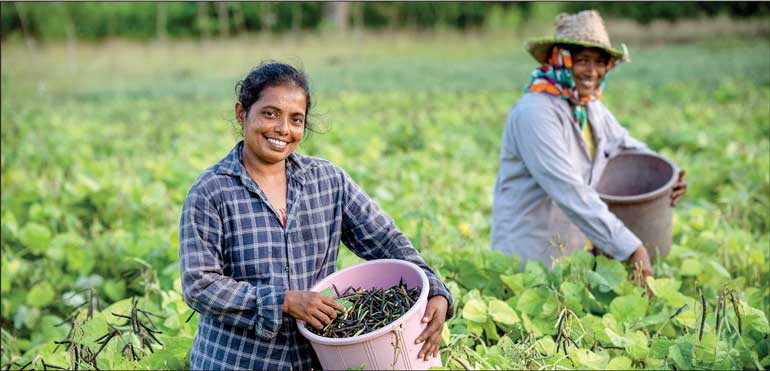Thursday Feb 19, 2026
Thursday Feb 19, 2026
Wednesday, 7 February 2024 00:02 - - {{hitsCtrl.values.hits}}

 Selyn, a women-led handloom business, offers flexible employment and valuable income opportunities to about 1,000 women artisans and persons from marginalised groups in rural Sri Lanka. Selyn develops and exports high-value craft products in global markets. The bigger revenue margins of quality products translate into better incomes for women artisans. Thanks to its pioneering use of blockchain in the supply chain – consumers can track how their purchases translate into earnings for women in the informal economy.
Selyn, a women-led handloom business, offers flexible employment and valuable income opportunities to about 1,000 women artisans and persons from marginalised groups in rural Sri Lanka. Selyn develops and exports high-value craft products in global markets. The bigger revenue margins of quality products translate into better incomes for women artisans. Thanks to its pioneering use of blockchain in the supply chain – consumers can track how their purchases translate into earnings for women in the informal economy.
The Small Organic Farmers Association (SOFA) of Sri Lanka, produces and exports organic food while creating a sustainable and equitable environment for smallholder farmers. It facilitates fair trade certification for smallholders and links more than 3,600 organic farmers to export markets.
WindForce, the largest renewable energy developer in Sri Lanka, owns, develops and operates renewable energy power plants that provide clean energy access to businesses, communities and industries. WindForce allocates a portion of the profits into community development projects to support the welfare of local communities including livelihood support, education and childhood development, environmental conservation and healthcare.
These are a few examples of inclusive and sustainable businesses that go beyond the usual “profit-first” market approach to provide affordable goods, services and livelihoods to low-income people and to support environmental sustainability in Sri Lanka.
With ambitious reforms taking centre-stage towards rebuilding Sri Lanka into a resilient and sustainable economy, the Government of Sri Lanka is exploring opportunities to harness the potential of the private sector in fostering inclusive and sustainable growth.
On 31 January, a groundbreaking Strategy to Promote Inclusive and Sustainable Businesses to Achieve the Sustainable Development Goals was officially launched by the Government of Sri Lanka. Designed by the Sustainable Development Council of Sri Lanka in collaboration with the United Nations Economic and Social Commission for Asia and the Pacific (ESCAP) and United Nations Sri Lanka, this strategic roadmap envisions a strong and dynamic ecosystem where inclusive and sustainable businesses like Selyn, SOFA and WindForce can not only emerge but thrive.
Inclusive and sustainable businesses are purpose-driven enterprises that deliberately seek positive change in communities and the environment. These impact businesses can play a crucial role to achieve national social development and environment sustainability goals. Inclusive and sustainable businesses use market-based approaches to achieve positive social and environmental impacts, while ensuring their own commercial sustainability.
The strategy seeks to put in place regulations that encourage and recognise inclusive and sustainable businesses, provide training and services that help businesses pivot towards more inclusive and sustainable practices, and improve access to finance for businesses. It builds on and brings together for the first time the collaborative and cross-sectoral efforts of Government agencies, private sector organisations and development partners, to shape an inclusive, sustainable and resilient economy. Actions will cover five core areas:
Sri Lanka’s commitment to this strategy is a testament to its aspiration for a sustainable and inclusive future where businesses are not just economic entities but forces for positive change.
(Marta Perez Cuso, is Economic Affairs Officer, United Nations Economic and Social Commission for Asia and the Pacific (ESCAP) and Yihan Zhao, is Associate Economic Affairs Officer, United Nations Economic and Social Commission for Asia and the Pacific (ESCAP).)